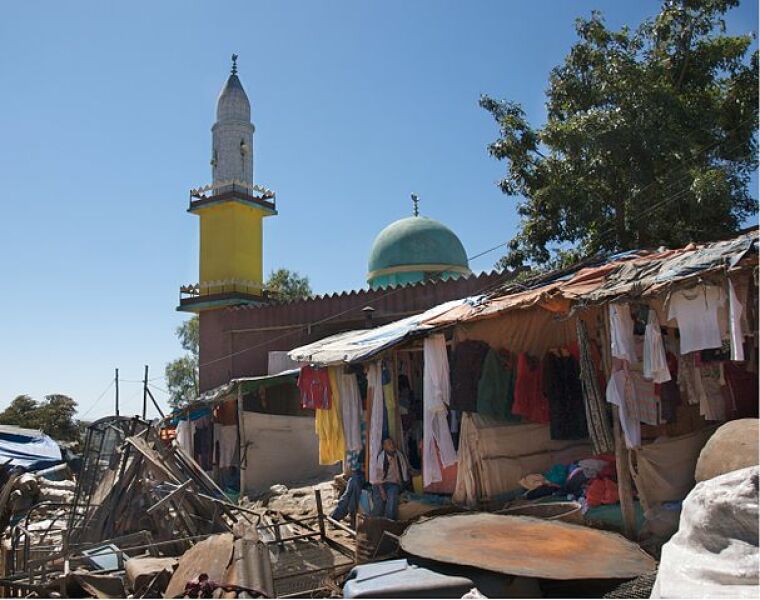Ethiopian Muslim beats wife for converting to Christianity

An Ethiopian woman spent three days at a hospital after she was beaten by her husband for converting to Christianity. Habiba Ibrahim, mother of three, had been a Christian for about a month before her husband found out and attacked her.
Ibrahim converted to Christianity on Aug. 2. Her husband, Ibrahim Dido, found out about her conversion on Sept. 10 after the morning prayers at a nearby mosque.
"He locked me in the house and began beating me with sticks, and immediately neighbors arrived and rescued me from my husband's wrath," Ibrahim told Morning Star News.
One of her neighbors said that Ibrahim's clothes were blood-stained due to a deep cut on her forehead.
"Her husband was shouting, saying that she should die for forsaking Islam," the neighbor said.
Ibrahim was brought to a clinic in Bokulu Boma and was sent home after three days.
Her conversion was part of an evangelistic program in northern Kenya and southern Ethiopia that began 10 years ago. The evangelists used the Burj language which was spoken by people living in the Moyale area on both sides of the border.
Ibrahim said that she wavered from performing Islamic rituals after conversion which was noticed by her husband.
"My husband began questioning me on my laxity in Islamic activities, which I did not respond to," Ibrahim said.
A week before the attack, a woman from the church came to her and warned her to be careful because Muslims have discovered her conversion to Christianity.
At present, Ibrahim and her three children have relocated to another village but they are still in need of financial and medical support.
About 34 percent of Ethiopia's population are Muslims. The Open Doors World Watch list ranks it as 18th most difficult country to be a Christian.
Earlier this month, more than 700 Muslim prisoners received pardon from the Ethiopian government as part of the celebration of Eid al-Adha. Some of the pardoned convicts were charged under a controversial anti-terror law. Critics claimed that the law has been used to suppress dissent and imprison political opposition members.
 Christians don't have to affirm transgenderism, but they can’t express that view at work: tribunal
Christians don't have to affirm transgenderism, but they can’t express that view at work: tribunal Archaeology discovery: Medieval Christian prayer beads found on Holy Island
Archaeology discovery: Medieval Christian prayer beads found on Holy Island Presbyterian Church in America votes to leave National Association of Evangelicals
Presbyterian Church in America votes to leave National Association of Evangelicals Over 50 killed in 'vile and satanic' attack at Nigerian church on Pentecost Sunday
Over 50 killed in 'vile and satanic' attack at Nigerian church on Pentecost Sunday Ukrainian Orthodox Church severs ties with Moscow over Patriarch Kirill's support for Putin's war
Ukrainian Orthodox Church severs ties with Moscow over Patriarch Kirill's support for Putin's war Islamic State kills 20 Nigerian Christians as revenge for US airstrike
Islamic State kills 20 Nigerian Christians as revenge for US airstrike Man who served 33 years in prison for murder leads inmates to Christ
Man who served 33 years in prison for murder leads inmates to Christ


 Nigerian student beaten to death, body burned over ‘blasphemous’ WhatsApp message
Nigerian student beaten to death, body burned over ‘blasphemous’ WhatsApp message 'A new low': World reacts after Hong Kong arrests 90-year-old Cardinal Joseph Zen
'A new low': World reacts after Hong Kong arrests 90-year-old Cardinal Joseph Zen Iran sentences Christian man to 10 years in prison for hosting house church worship gathering
Iran sentences Christian man to 10 years in prison for hosting house church worship gathering French Guyana: Pastor shot dead, church set on fire after meeting delegation of Evangelicals
French Guyana: Pastor shot dead, church set on fire after meeting delegation of Evangelicals ‘Talking Jesus’ report finds only 6% of UK adults identify as practicing Christians
‘Talking Jesus’ report finds only 6% of UK adults identify as practicing Christians Mission Eurasia ministry center blown up in Ukraine, hundreds of Bibles destroyed: 'God will provide'
Mission Eurasia ministry center blown up in Ukraine, hundreds of Bibles destroyed: 'God will provide' Church holds service for first time after ISIS desecrated it 8 years ago
Church holds service for first time after ISIS desecrated it 8 years ago Burger King apologizes for 'offensive campaign' using Jesus' words at the Last Supper
Burger King apologizes for 'offensive campaign' using Jesus' words at the Last Supper Uganda: Muslims abduct teacher, burn him inside mosque for praying in Christ’s name
Uganda: Muslims abduct teacher, burn him inside mosque for praying in Christ’s name